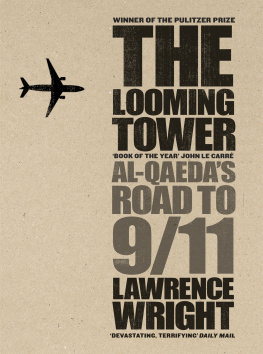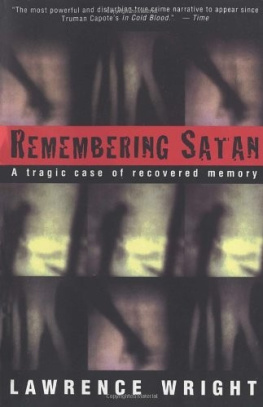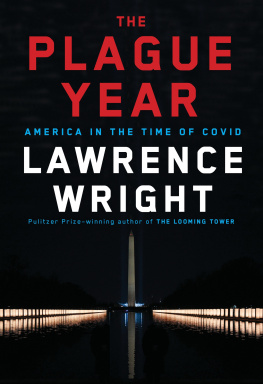Lawrence Wright - The Looming Tower: Al-Qaeda and the Road to 9/11
Here you can read online Lawrence Wright - The Looming Tower: Al-Qaeda and the Road to 9/11 full text of the book (entire story) in english for free. Download pdf and epub, get meaning, cover and reviews about this ebook. year: 2006, publisher: Vintage, genre: History. Description of the work, (preface) as well as reviews are available. Best literature library LitArk.com created for fans of good reading and offers a wide selection of genres:
Romance novel
Science fiction
Adventure
Detective
Science
History
Home and family
Prose
Art
Politics
Computer
Non-fiction
Religion
Business
Children
Humor
Choose a favorite category and find really read worthwhile books. Enjoy immersion in the world of imagination, feel the emotions of the characters or learn something new for yourself, make an fascinating discovery.
- Book:The Looming Tower: Al-Qaeda and the Road to 9/11
- Author:
- Publisher:Vintage
- Genre:
- Year:2006
- Rating:3 / 5
- Favourites:Add to favourites
- Your mark:
- 60
- 1
- 2
- 3
- 4
- 5
The Looming Tower: Al-Qaeda and the Road to 9/11: summary, description and annotation
We offer to read an annotation, description, summary or preface (depends on what the author of the book "The Looming Tower: Al-Qaeda and the Road to 9/11" wrote himself). If you haven't found the necessary information about the book — write in the comments, we will try to find it.
The Looming Tower: Al-Qaeda and the Road to 9/11 — read online for free the complete book (whole text) full work
Below is the text of the book, divided by pages. System saving the place of the last page read, allows you to conveniently read the book "The Looming Tower: Al-Qaeda and the Road to 9/11" online for free, without having to search again every time where you left off. Put a bookmark, and you can go to the page where you finished reading at any time.
Font size:
Interval:
Bookmark:

CONTENTS
This is for my family,
Roberta, Caroline, Gordon & Karen


PROLOGUE
ON SAINT PATRICKS DAY , Daniel Coleman, an agent in the New York office of the Federal Bureau of Investigation handling foreign intelligence cases, drove down to Tysons Corner, Virginia, to report for a new posting. The sidewalks were still buried under gray banks of snow from the blizzard of 1996 a few weeks before. Coleman entered an undistinguished government office tower called the Gloucester Building and got off the elevator at the fifth floor. This was Alec Station.
Other stations of the Central Intelligence Agency are located in the various countries that they cover; Alec was the first virtual station, situated only a few miles from the headquarters building in Langley. On an organizational chart it was labeled Terrorist Financial Links, a subsection of the CIAs Counterterrorist Center, but in practice it was devoted to tracking the activities of a single man, Osama bin Laden, whose name had arisen as the master financier of terror. Coleman first heard of him in 1993, when a foreign source spoke about a Saudi prince who was supporting a cell of radical Islamists who were plotting to blow up New York landmarks, including the United Nations, the Lincoln and Holland tunnels, and even 26 Federal Plaza, the building where Coleman worked. Now, three years later, the bureau had finally found time to send him to look over the intelligence the agency had compiled to see if there was any reason to pursue an investigation.
Alec Station already had thirty-five volumes of material on bin Laden, consisting mostly of transcripts of telephone conversations that had been sucked up by the electronic ears of the National Security Agency. Coleman found the material repetitive and inconclusive. Still, he opened an intelligence case on bin Laden, largely as a placeholder in case the Islamist financier turned out to be something more than that. Like many agents, Dan Coleman had been trained to fight the Cold War. He joined the FBI as a file clerk in 1973. Scholarly and inquisitive, Coleman was naturally drawn to counterintelligence. In the 1980s, he concentrated on recruiting communist spies in the populous diplomatic community surrounding the United Nations; an East German attach was a particular treasure. In 1990, however, when the Cold War had just ended, he found himself on a squad devoted to Middle Eastern terrorism. There was little in his background that prepared him for this new turnbut that was true of the bureau as a whole, which regarded terrorism as a nuisance, not a real threat. It was difficult to believe, in those cloudless days after the fall of the Berlin Wall, that America had any real enemies still standing.
Then, in August 1996, bin Laden declared war on America from a cave in Afghanistan. The stated cause was the continued presence of U.S. forces in Saudi Arabia five years after the first Gulf War. Terrorizing you, while you are carrying arms in our land, is a legitimate right and a moral obligation, he stated. He presumed to speak on behalf of all Muslims, and even directed some of his lengthy fatwa to U.S. Secretary of Defense William Perry personally. I say to you, William, that: These youths love death as you love life. These youths will not ask you for explanations. They will sing out that there is nothing between us that needs to be explained, there is only killing and neck-smiting.
Other than Coleman, few in Americaeven in the bureauknew or cared about the Saudi dissident. The thirty-five volumes in Alec Station painted a picture of a messianic billionaire from a sprawling, influential family that was closely connected to the rulers of the Kingdom of Saudi Arabia. He had made a name for himself in the jihad in Afghanistan against the Soviet occupation. Coleman had read enough history to understand the references in bin Ladens war cry to the Crusades and the early struggles of Islam. Indeed, one of the striking features of the document was that time seemed to have stopped a thousand years ago. There was now and there was then, but there was nothing in between. It was as if the Crusades were still going on in bin Ladens universe. The intensity of the anger was also difficult for Coleman to grasp. What did we do to him? he wondered.
Coleman showed the text of bin Ladens fatwa to prosecutors from the U.S. Attorneys Office for the Southern District of New York. It was droll, it was weird, but was it a crime? The lawyers puzzled over the language and found a rarely invoked seditious conspiracy statute from the Civil War era that forbids instigating violence and attempting to overthrow the U.S. government. It seemed a stretch to think that it might be applied to a stateless Saudi in a cave in Tora Bora, but on the basis of such meager precedent, Coleman opened a criminal file on the figure who would become the most wanted man in the FBIs history. He was still working entirely alone.
A few months later, in November 1996, Coleman traveled to an American military base in Germany with two U.S. attorneys, Kenneth Karas and Patrick Fitzgerald. There in a safe house was a jittery Sudanese informer named Jamal al-Fadl, who claimed to have worked for bin Laden in Khartoum. Coleman carried a briefing book with photographs of bin Ladens known associates, and Fadl quickly identified most of them. He was selling a story, but he clearly knew the players. The problem was that he kept lying to the investigators, embroidering his tale, depicting himself as a hero who only wanted to do the right thing.
So why did you leave? the prosecutors wanted to know.
Fadl said that he loved America. He had lived in Brooklyn and he spoke English. Then he said he had run away so he could write a best-selling book. He was keyed up and had a hard time sitting still. Obviously, he had a lot more to tell. It took several long days to get him to stop confabulating and admit that he had run off with more than $ 100,000 of bin Ladens money. When he did that, he sobbed and sobbed. It was the turning point in the interrogation. Fadl agreed to be a government witness should a trial ever occur, but that seemed unlikely, given the modest charges that the government lawyers were considering.
Then, on his own initiative, Fadl began talking about an organization called al-Qaeda. It was the first time any of the men in the room had ever heard the term. He described training camps and sleeper cells. He talked about bin Ladens interest in acquiring nuclear and chemical weapons. He said that al-Qaeda had been responsible for a 1992 bombing in Yemen and for training the insurgents who shot down the American helicopters in Somalia that same year. He gave names and drew organizational charts. The investigators were stunned by his story. For two weeks, six or seven hours a day, they went over the details again and again, testing his responses to see if he was consistent. He never varied.
When Coleman got back to the bureau, no one seemed particularly interested. Fadls testimony was chilling, they agreed, but how could they corroborate the testimony of a thief and a liar? Besides, there were other more pressing investigations.
For a year and a half, Dan Coleman continued his solitary investigation of bin Laden. Because he was posted to Alec Station, the bureau more or less forgot about him. Using wiretaps on bin Ladens businesses, Coleman was able to draw a map of the al-Qaeda network, which extended throughout the Middle East, Africa, Europe, and Central Asia. He was alarmed to realize that many of al-Qaedas associates had ties to the United States. He concluded this was a worldwide terror organization dedicated to destroying America, but Coleman couldnt even get his superiors to return his phone calls on the matter.
Next pageFont size:
Interval:
Bookmark:
Similar books «The Looming Tower: Al-Qaeda and the Road to 9/11»
Look at similar books to The Looming Tower: Al-Qaeda and the Road to 9/11. We have selected literature similar in name and meaning in the hope of providing readers with more options to find new, interesting, not yet read works.
Discussion, reviews of the book The Looming Tower: Al-Qaeda and the Road to 9/11 and just readers' own opinions. Leave your comments, write what you think about the work, its meaning or the main characters. Specify what exactly you liked and what you didn't like, and why you think so.





